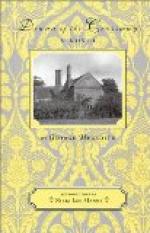in the opinion of Arthur Rhodes; and the story was
more romantic; modelled on a Prima Donna she had met
at the musical parties of Henry Wilmers, after hearing
Redworth tell of Charles Rainer’s quaint passion
for the woman, or the idea of the woman. Diana
had courted her, studied and liked her. The picture
she was drawing of the amiable and gifted Italian,
of her villain Roumanian husband, and of the eccentric,
high-minded, devoted Englishman, was good in a fashion;
but considering the theme, she had reasonable apprehension
that her
cantatrice would not repay her for the
time and labour bestowed on it. No clever transcripts
of the dialogue of the day occurred; no hair-breadth
’scapes, perils by sea and land, heroisms of
the hero, fine shrieks of the heroine; no set scenes
of catching pathos and humour; no distinguishable
points of social satire—equivalent to a
smacking of the public on the chaps, which excites
it to grin with keen discernment of the author’s
intention. She did not appeal to the senses nor
to a superficial discernment. So she had the
anticipatory sense of its failure; and she wrote her
best, in perverseness; of course she wrote slowly;
she wrote more and more realistically of the characters
and the downright human emotions, less of the wooden
supernumeraries of her story, labelled for broad guffaw
or deluge tears—the grappling natural links
between our public and an author. Her feelings
were aloof. They flowed at a hint of a scene
of
the young Minister. She could
not put them into
the cantatrice.
And Arthur Rhodes pronounced this work poetical beyond
its predecessors, for the reason that the chief characters
were alive and the reader felt their pulses.
He meant to say, they were poetical inasmuch as they
were creations.
The slow progress of a work not driven by the author’s
feelings necessitated frequent consultations between
Debit and Credit, resulting in altercations, recriminations,
discord of the yoked and divergent couple. To
restore them to their proper trot in harness, Diana
reluctantly went to her publisher for an advance item
of the sum she was to receive, and the act increased
her distaste. An idea came that she would soon
cease to be able to write at all. What then?
Perhaps by selling her invested money, and ultimately
The Crossways, she would have enough for her term
upon earth. Necessarily she had to think that
short, in order to reckon it as nearly enough.
‘I am sure,’ she said to herself, ‘I
shall not trouble the world very long.’
A strange languor beset her; scarcely melancholy,
for she conceived the cheerfulness of life and added
to it in company; but a nervelessness, as though she
had been left by the stream on the banks, and saw
beauty and pleasure sweep along and away, while the
sun that primed them dried her veins. At this
time she was gaining her widest reputation for brilliancy
of wit. Only to welcome guests were her evenings




